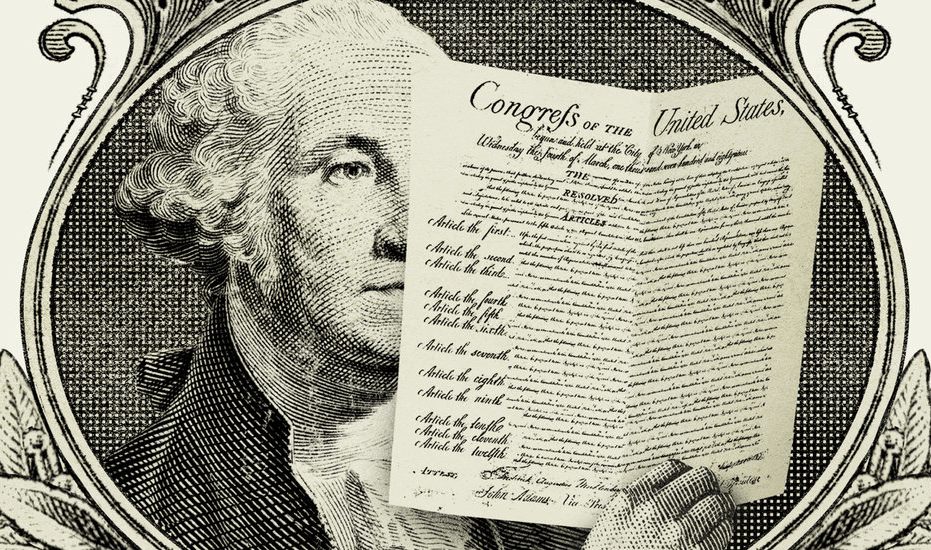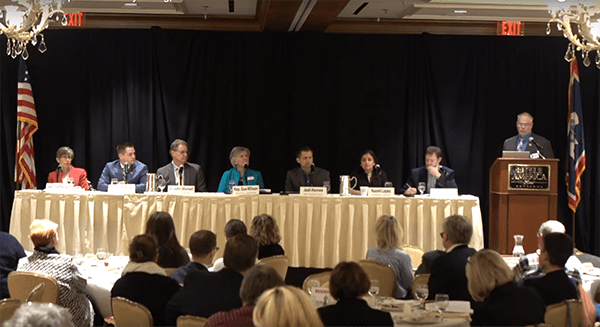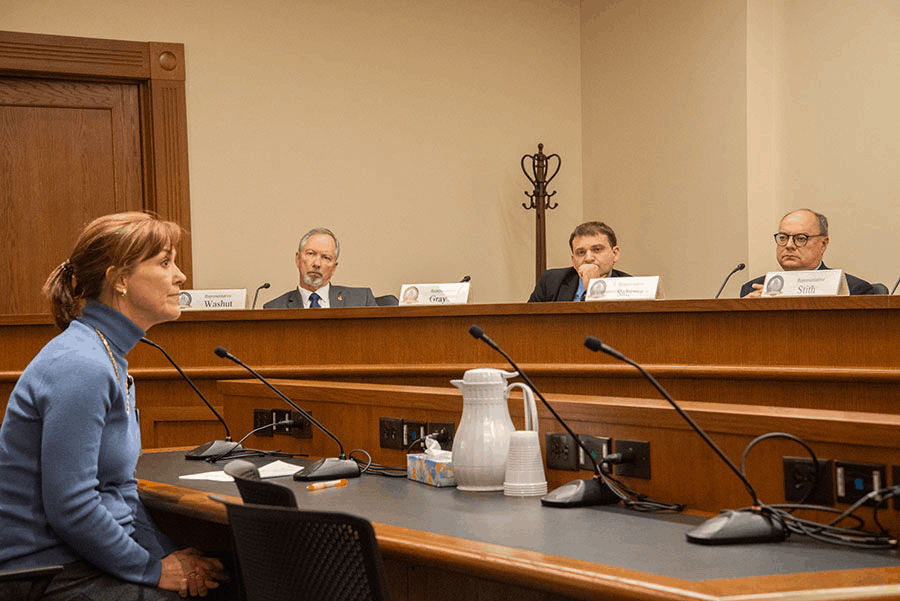Opponents of a proposed Wyoming corporate income tax say it’s unconstitutional. They’re wrong.
If you’ve lived in Wyoming over the past 30 years you’ve seen Walmart come to your town or a town near you while Main Street shops close up.
This is part of a larger national trend of corporations replacing local businesses. These corporations generate profits from local sales and send the money out of communities, back to corporate headquarters and shareholders.
Most states address this situation with a corporate income tax. This way, they can capture a portion of corporate profits to help pay for public services and infrastructure—after all, big chain stores expect the communities where they do business to have fire departments, streets, police, hospitals, and schools.
Wyoming is one of only two states nationwide that doesn’t have any form of corporate tax. A new proposed bill would change that.
The National Corporate Profit Recapture Act would impose an income tax on corporations with more than 100 shareholders that operate in Wyoming.
The bill would tax big companies like Walmart, Applebee’s, Home Depot, FedEx, and other national and global chains, while sparing Mom and Pop shops any increased tax burden. It would generate tens of millions of dollars per year, which would be allocated to the state’s education budget.
A bogus argument
Taxing Walmart to help pay for Wyoming schools seems like it would be a pretty popular idea, even in our notoriously anti-tax Legislature. And, indeed, a similar proposal had broad support last legislative session. But was narrowly defeated.
The new and improved version of the bill, which the Legislature’s Joint Revenue Committee will consider on Sept. 19, also has its detractors. Some are simply no-tax-ever, taxation-is-theft, right-wing zealots like Sen. Bo Biteman (R-Ranchester), who is more than happy to admit he’d rather defund Wyoming schools than tax Walmart.
“Unconstitutional” is a pretty intimidating term, especially when it’s in an accusation leveled by a state lawmaker.
But others aren’t so keen to admit where their loyalties lie. These lawmakers don’t want to go on record supporting a tax, because doing so would threaten their politically precious conservative credentials.
But neither do they want to support protecting corporate profits over commonsense tax reform.
These lawmakers, like Sen. Affie Ellis (R-Cheyenne), have found what they think is a safer line of attack: They’re claiming that the National Corporate Profit Recapture Act is unconstitutional because it unfairly targets out-of-state businesses.
“Unconstitutional” is a pretty intimidating term, especially when it’s in an accusation leveled by a state lawmaker.
But in this case, the term should be harmless. Because the argument is bogus.
The experts
Michael Mazerov admits he was concerned when he first read a draft of the National Corporate Profit Recapture Act.
The senior fellow at the Center for Budget and Policy Priorities is one of the nation’s top experts on state taxes. He thought the proposed Wyoming corporate income tax might violate the U.S. Constitution’s Commerce Clause.
The problem, Mazerov thought, dealt with Wyoming’s unique constitutional provision that says if the state ever implements an income tax—personal, corporate, or otherwise—taxpayers would automatically receive a credit for the sales and property taxes they already paid.
“The court will rule against a tax that obviously discriminates against out-of-state corporations,” Mazerov said. “This proposal doesn’t.”
Since out-of-state companies would presumably pay less in sales and property taxes than Wyoming-based companies, they would receive less of a credit. As a result, the law would be biased against out-of-state companies.
On further consideration, however, Mazerov realized that his initial impression was wrong.
He explained to Better Wyoming that the formula the proposed tax would use to determine how much a company owes would balance out any bias against out-of-state companies. Called the “apportionment formula,” it would tax companies according to how much of their total property and payroll is in Wyoming.
For instance, a huge out-of-state corporation like Walmart has only a tiny fraction of its property and payroll in Wyoming, so a tiny fragment of its profits would be taxed. A Wyoming-based company with more than 100 shareholders, however, would have a far greater share of its profits subject to the tax.
In this manner, the proposal balances out the way it would affect in- and out-of-state corporations. Keep in mind that all this is mostly hypothetical, since there are no Wyoming-based corporations with more than 100 shareholders.
“The court will rule against a tax that obviously discriminates against out-of-state corporations,” Mazerov said. “This [proposal] doesn’t.”
The lobbyist
The Wyoming Supreme Court has struck down a tax in the past for being unconstitutional. In 1987, it ruled that a property tax passed by the Legislature violated the state constitution’s uniformity clause. The problem, the court ruled, was that the tax treated different “classes” of taxpayers in different ways.
During the 2019 legislative session, a lobbyist from the law firm Holland and Hart brought up this case in order to argue against the previous proposed income tax. Commonly called the “Big Box Tax,” it also targeted corporations with more than 100 shareholders, but only those within the retail, hospitality, and food service industries.
The lobbyist, Walter Eggers, is an attorney for the mineral industries. He told a Senate committee that the proposed “Big Box Tax” raised uniformity clause concerns because it treated different “classes” of corporations—i.e., those with more than 100 shareholders and those in the three specific industries—differently.
When he recently spoke with Better Wyoming, Eggers said that he had not been following the new version of the corporate income tax, but he said that its constitutionality may depend on whether it had resolved these uniformity issues.
Income tax law is not property tax law
It turns out, however, that Eggers is probably wrong.
Phil Horwitz is a professor of state tax law at Denver University and an attorney at the firm Moss Adams. Prior to that, he was the Director of Tax Policy Analysis for the Colorado Department of Revenue. He has been working in state tax law for 25 years.
Uniformity clauses almost without exception apply to ad valorem, or property, taxes, and not income taxes.
Horwitz told Better Wyoming that most states have both uniformity clauses in their constitutions and corporate income taxes that treat different “classes” of companies differently.
That’s because uniformity clauses almost without exception apply to ad valorem, or property, taxes, and not income taxes. There is very little precedent, he said, to suggest that an income tax would run afoul of a uniformity clause.
An income tax might be unconstitutional, Horwitz said, if it treated different companies within a single “class” differently. But the proposed National Corporate Profit Recapture Act would create a single “class”—made up of companies with more than 100 shareholders—and treat all of those companies the same.
The 1987 case that Eggers brought up showed that the Wyoming Supreme Court is willing to strike down a tax, Horwitz said, but that dealt with property tax.
“The rules for income tax are different,” he said.
The claim
In an email to one of her constituents, Sen. Affie Ellis wrote that she opposed the National Corporate Recapture Act because she thought it was unconstitutional.

Sen. Affie Ellis
In the email, which was forwarded to Better Wyoming, Ellis wrote that she has “significant concerns” about the constitutionality of the proposal “both under the Wyoming Constitution and the United States Constitution. Legislation cannot single-out or discriminate against out-of-state corporations; in my view, the 100 or more shareholder requirement contained in these bills does just that. If taken to court, I believe that this provision would violate the federal Commerce Clause and its Wyoming corollary.”
Ellis is also an attorney at Holland and Hart, alongside Walter Eggers, the lobbyists who brought up the constitutionality question in the first place.
Ducking the real arguments
As Mazerov and Horwitz—people who have spent their professional lives working with state tax policy—explained, however, Ellis’ and Eggers’ claims are unfounded.
Mazerov said it’s also worth noting that none of the tax experts from conservative organizations opposing the proposal, like the Tax Foundation, are questioning it on constitutional grounds. This is despite the fact that the Tax Foundation’s Jared Walczak has written about the corporate tax proposals repeatedly, and even flew to Cheyenne to testify in July before the Joint Revenue Committee.
“When people start to make really weird technical arguments, it’s because they can’t make the big arguments without exposing the true nature of what they’re protecting.”
Ali Mickelson, the director of legislative and tax policy at the Colorado Fiscal Institute, likewise disagreed that the Corporate Profit Recapture Act would have any constitutional problems as a result of its targeting companies with more than 100 shareholders.
In fact, she told Better Wyoming, it’s fairly common for state taxes to specifically target Big Business. For instance, Colorado recently amended a tax break that retailers receive in a way that raised taxes for the richest 2 percent of companies operating in Colorado. Meanwhile, it spared or decreased taxes for the other 98 percent of companies, while raising up to $50 million a year for low-income housing.
Mickelson said that she grows suspicious when lawmakers start trotting out questions of constitutionality or other esoteric legal claims instead of addressing issues head-on. She said it often means lawmakers have something to hide.
“When people start to make really weird technical arguments, it’s because they can’t make the big arguments without exposing the true nature of what they’re protecting,” Mickelson said.
So, instead of simply saying they’re afraid to support a tax that would have Walmart pay their fair share to fund Wyoming schools, Wyoming legislators are hiding behind bogus constitutionality claims.
But ask any tax expert, from any part of the political spectrum, whether this argument holds water and you’ll get the same dismissive response.
We’ll see whether expertise or fear-mongering will prevail when the Joint Revenue Committee meets on Sept. 19.












